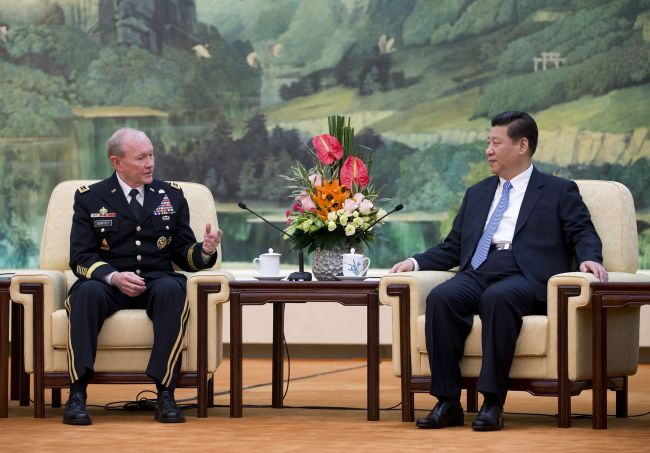The U.S. government is keeping close tabs on North Korean military actions, the White House said Monday, after a top Chinese military official formally raised the possibility of another nuclear test by Pyongyang.
The White House would not be surprised if North Korea launches a missile or takes other provocative steps, its spokesman Jay Carney said at a press briefing.
“We remain in a state of constant monitoring and vigilance with regards to all the developments that we have seen in recent weeks,” Carney added.
After weeks of ferocious military threats, Pyongyang is talking about the terms of dialogue. The communist nation calls for disarmament talks with the U.S., not denuclearization discussions.
The White House would not be surprised if North Korea launches a missile or takes other provocative steps, its spokesman Jay Carney said at a press briefing.
“We remain in a state of constant monitoring and vigilance with regards to all the developments that we have seen in recent weeks,” Carney added.
After weeks of ferocious military threats, Pyongyang is talking about the terms of dialogue. The communist nation calls for disarmament talks with the U.S., not denuclearization discussions.

The U.S. dismissed the offer as unacceptable, saying it would never tolerate the North’s development and possession of nuclear bombs.
With the world paying close attention to the actions of North Korea in the coming weeks, China’s top military general said Pyongyang may conduct a forth nuclear test.
“(North Koreans) held their third nuclear test (in February) and it is very likely they are going to hold their fourth test,” Chief of the General Staff Gen. Fang Fenghui said after talks with his U.S. counterpart, Gen. Martin Dempsey, in Beijing.
“In this situation, we ask all sides to work on (getting) the North Koreans to stop nuclear tests and stop producing nuclear weapons. We believe that dialogue should be the right solution,” he added.
On Tuesday, North Korea repeated its demand for recognition as a nuclear weapons state, rejecting a U.S. condition that it agree to give up its nuclear arms program before talks can begin.
“If the DPRK sits at a table with the U.S., it has to be a dialogue between nuclear weapons states, not one side forcing the other to dismantle nuclear weapons,” the Rodong Sinmun newspaper said, referring to the North by its official name, the Democratic People’s Republic of Korea.
North Korea signed a denuclearization-for-aid deal in 2005 but later backed out of that pact. It now says its nuclear arms are a “treasured sword” that it will never give up.
The U.S. and China began high-level talks in Washington Monday aimed at reviving dialogue with Pyongyang.
Wu Dawei, Chinese special representative for Korean Peninsula affairs, met with his U.S. counterpart, Glyn Davies, and Dan Friend, who leads the sanctions office at the State Department.
He arrived in Washington on Sunday for a four-day stay, his first official trip to the U.S. since 2010.
Wu, Beijing’s long-standing point man on Washington, led several rounds of the six-party talks on North Korea’s nuclear program, which also involves South Korea, Japan and Russia.
Wu’s visit here will be followed by a trip by U.S. Deputy Secretary of State William Burns to Beijing on Wednesday and Thursday.
Wu may also travel to Pyongyang after his Washington stop, according to some news reports.
Meanwhile, South Korean Foreign Minister Yun Byung-se will leave for China Wednesday for talks with Chinese officials.
Yun is scheduled to hold talks with Chinese Foreign Minister Wang Yi and meet with Wang Jiarui, chief of the Chinese Communist Party’s International Liaison Department during his one-day trip to Beijing, ministry officials said.
“The two ministers will exchange their assessments of the current situation on the Korean Peninsula and explore ways to closely cooperate on future responses,” a senior official at Seoul’s foreign ministry said.
In a press briefing on Tuesday, Seoul’s Foreign Miinistry spokesman Cho Tai-young emphasized China’s role for peace and stability on the peninsula.
“We believe that China can play an important role to continue to secure peace and stability on the Korean Peninsula,” Cho said.
(From news reports )
-
Articles by Korea Herald










![[Robert J. Fouser] Social attitudes toward language proficiency](http://res.heraldm.com/phpwas/restmb_idxmake.php?idx=644&simg=/content/image/2024/05/16/20240516050799_0.jpg&u=)
![[Graphic News] How much do Korean adults read?](http://res.heraldm.com/phpwas/restmb_idxmake.php?idx=644&simg=/content/image/2024/05/16/20240516050803_0.gif&u=)






![[Herald Interview] Byun Yo-han's 'unlikable' character is result of calculated acting](http://res.heraldm.com/phpwas/restmb_idxmake.php?idx=652&simg=/content/image/2024/05/16/20240516050855_0.jpg&u=)
